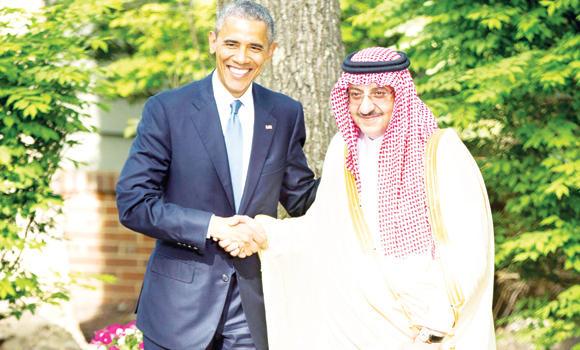This article originally appeared in Muftah.org and has been republished with permission.
By Eric Eikenberry, advocacy associate at ADHRB
Two weeks ago, the U.S. campaign to win the hearts and minds of potential ISIS supporters resurfaced in Saudi Arabia. In an article titled, “The World Is Winning the Online Battle with Da’esh” (a fairly close translation of a July op-ed in The Washington Post), U.S. Undersecretary of State for Public Diplomacy Richard Stengel assured readers of the Saudi daily Al-Hayat that, while ISIS’s allure stems from slick marketing, backing for the group is somewhere between negligible and miniscule. Undersecretary Stengel’s confidence, however, cannot mask a concern with ISIS’s growth that has U.S. officials taking to the pages of Saudi papers.
Indeed, ISIS has claimed responsibility for several attacks inside the Kingdom. In late July, Saudi authorities arrested over 400 people for alleged connections to the organization. Though polls demonstrate that ISIS remains popular among only a small percentage of Saudis, it has attracted enough material support for the U.S. Department of State to make a show of being unconcerned.
When Saudi Arabia’s King Salman meets with President Obama this Friday for a discussion that the U.S. Press claims will be all about Iran, these concerns will loom large. ISIS will undoubtedly be a priority issue in the conversation between the two leaders. Countering the ISIS narrative, however, is also a fraught endeavor, and Saudi Arabia is far from an ideal partner in this effort.
In a July 6 statement on the importance of combating the ideology advanced by ISIS, President Obama stated that it is the responsibility of governments “to address the political and economic grievances that terrorists exploit.” The Saudi government perpetuates, rather than resolves, contentious issues in the Kingdom. President Obama further emphasized the importance of rejecting sectarianism and exposing “warped” interpretations of Islam. Saudi authorities have done the opposite by deepening intra-religious divisions and maintaining a system of governance which, in terms of criminal punishment and social policing, mirrors that of ISIS.
U.S. officials committed to fighting ISIS on the ideological field should not, however, write Saudi Arabia off as an unworkable partner. There are plenty of men and women in the country who can articulate popular social and political grievances in a manner that leads those who are dissatisfied away from violent extremism and toward constructive nonviolent action. Many just happen to be in jail.
The Saudi government has, unfortunately, imprisoned many of its own citizens who have provided an effective counter-narrative to ISIS. Waleed Abu al-Khair, for one, preached and practiced nonviolent activism for years. During the day, he was a human rights lawyer taking on the cases of marginalized Saudi citizens. In his spare time, he was a reformer, hosting political discussions in his home and advocating for civil liberties. For these activities, Saudi authorities tried Abu al-Khair as a terrorist and sentenced him to a 15-year prison term in July 2014.
The list goes on. Mihklif bin Daham al-Shammari advocated for greater understanding between Sunnis and Shia. In response, authorities arrested and tortured him in prison. Raif Badawi founded an online forum for peaceful dissent and challenged the government’s regressive interpretation of Islam. For his efforts, he has been issued 1,000 lashes and a 10-year prison sentence. Officials spared Badawi’s colleague, Souad al-Shammari, a similar fate, opting instead to arbitrarily detain her for three months and coerce her into signing a gag order. Samar Badawi, a human rights activist who publicly struggled against the country’s dehumanizing system of male guardianship and was banned from travel as a result.
But, perhaps, the best bulwark against extremism in the Kingdom is the Saudi Arabian Civil and Political Rights Association (ACPRA). Founded by an intergenerational mix of mostly academics and legal professionals, ACPRA advances a human rights discourse rooted in Islamic tradition. Its eleven founding members (nine of whom are in prison) call for a constitutional monarchy, expansive criminal justice reforms, and universal civil and political rights. Several members, including Indiana University graduate Mohammed al-Qahtani, have strongly supported women’s rights. All have risked their lives to document government abuses, including arbitrary detention and torture. Above all, ACPRA has embraced nonviolent resistance as the only path toward political reform. Indeed, members like Abdullah al-Hamid have frequently defended their work as a peaceful alternative to violent radicalization.
In his July 6 statement, President Obama called upon Muslim communities globally to “step up, in terms of pushing back as hard as they can” against extremism. Members of groups like ACPRA, if freed, would need no American encouragement to counter ISIS’s extremist messaging. Their commitment to an open and stable Saudi Arabia already compels them to do so.
How Saudi Arabia or the United States can win the hearts and minds of potential ISIS recruits in the Kingdom without the activism of imprisoned human rights defenders is anyone’s guess. The Saudi government’s own campaign against ISIS, as exemplified by rehabilitation programs for violent extremists and their sympathizers, stresses “obedience and loyalty to the state and its leadership,” and hardly follows President Obama’s July 6 exhortation that nations “empower citizens to decide their own destiny,” and “uphold human rights for all their people.” Saudi Arabia’s leaders have, quite literally, locked this message away in their jails.
When Obama and King Salman discuss ISIS this week, the president should press hard on his counter-narrative platform while emphasizing, still more forcefully, that the Saudi government is not well-suited for the task. True Saudi partners against extremism are to be found among Saudi Arabia’s imprisoned civil society, not won through tepid op-eds in a censored press. If the president truly wants the United States and its allies to offer a “more attractive and more compelling vision” than that promised by violent extremists, he will press for the freedom of Saudi activists when speaking to King Salman at the White House.





